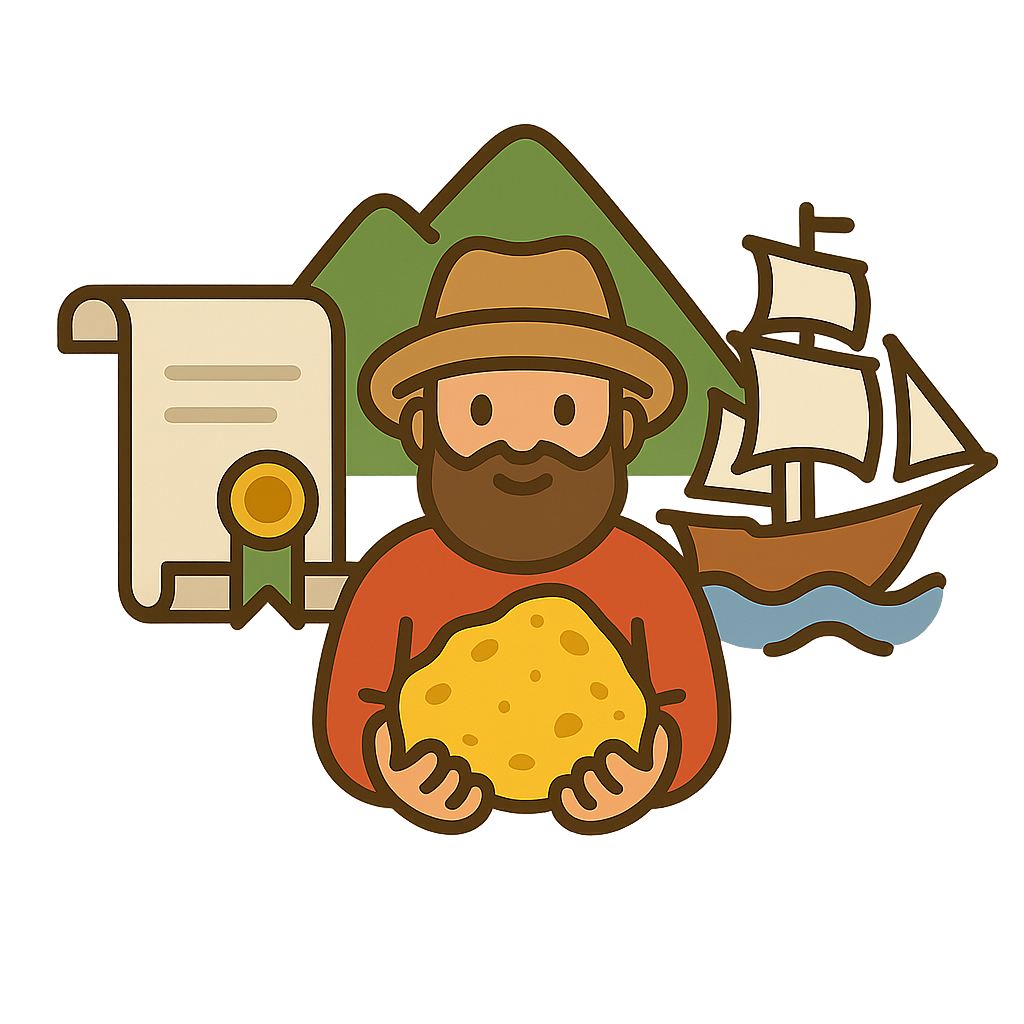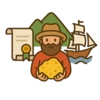Ethan's Gold: A Forty-Niner's Story
My name is Ethan, and before my great adventure, my world was as small and predictable as the cornfields on our Missouri farm. Life followed the seasons, a steady rhythm of planting and harvesting. But in the autumn of 1848, a new sound disrupted that rhythm. It started as a whisper, carried on the wind and in letters from the West. A man named James Marshall, working for John Sutter at a sawmill in a place called California, had found something shiny in a river. Gold. At first, it was just a rumor, something to talk about around the general store stove. But then the whispers grew into a roar. Newspapers printed incredible stories of men scooping up fortunes with their bare hands. They called it 'gold fever,' and I admit, I caught it bad. The thought of adventure, of seeing the vast country that lay beyond our town, was intoxicating. More than that, it was the dream of finding enough gold to help my family, to build a new and better life. The decision to leave was the hardest I ever made. I looked at my parents’ worried faces and promised I would be back in a year, my pockets heavy with gold. With a lump in my throat, I packed a small bag, joined a company of other hopefuls, and turned my face toward the setting sun.
Our journey west began in the spring of 1849, joining the great migration on what they called the California Trail. The sheer scale of it was breathtaking. As far as the eye could see, a line of canvas-covered wagons stretched across the rolling prairies, our own moving city on a sea of grass. The first part of the trip was filled with a sense of wonder. We marveled at herds of buffalo that thundered across the plains and learned to work together to ford wide, muddy rivers like the Platte. Every evening, we'd circle the wagons, and the air would fill with the scent of campfires, the sound of fiddles, and the murmur of shared stories. But the trail was a harsh teacher. Wagons broke down, and we had to learn to be blacksmiths and carpenters on the spot. We faced relentless heat, sudden storms, and the constant threat of sickness. The Rocky Mountains were a formidable barrier, a wall of stone that tested our strength and the endurance of our oxen. After the mountains came the desert, a vast, sun-baked expanse where water was scarcer than hope. There were days I felt so tired and discouraged that I wondered if we would ever make it. But in those moments, someone would share a bit of their water, tell a joke, or just walk alongside me in silent support. We were bound together by a shared dream, and we learned to rely on each other to survive. We were pushing into the unknown, leaving the old world behind with every step.
When we finally descended from the Sierra Nevada mountains into California, it felt like stepping into another world. The mining camps were nothing like the organized towns I had left behind. They were chaotic, sprawling cities of tents and rough wooden shacks, clinging to the sides of muddy ravines. The air buzzed with energy and a dozen different languages. Men had come from all over America, and even from as far as Mexico, Chile, China, and Europe, all drawn by the same golden dream. They called us the 'Forty-Niners,' and we were a brotherhood of hopefuls. I quickly learned that finding gold was nothing like the stories. It was back-breaking work. I spent my days standing knee-deep in the icy water of the American River, swishing sand and gravel around in a metal pan. My back ached constantly, and my hands were raw and cold. Most days, I found nothing. But then, just when my hope was fading, I'd see it. A tiny, gleaming flake at the bottom of the pan. The thrill of that discovery was electric, a jolt that made all the hard work feel worthwhile. But those flakes were few and far between. Life in the boomtowns was just as wild. Everything was outrageously expensive. I saw men pay a dollar for a single egg or ten dollars for a new shovel. Fortunes were made and lost not just in the rivers, but by merchants who sold supplies to the miners. It was a place of high hopes and deep disappointments, where a man's luck could change with the flick of a wrist.
I spent over a year in the goldfields, and while I found enough gold to send a little home and pay for my passage, I never struck it rich. I didn't find the great nugget that would change my life forever. As I prepared to leave California, I realized my pockets weren't heavy with gold, but my spirit was full of something else entirely. The journey had tested me in ways I never imagined. I had faced down mountains and deserts, sickness and despair, and I had not broken. I had learned to rely on myself, to fix a broken wheel, to find food in the wilderness, and to push on even when every part of me wanted to quit. That resilience was a treasure no one could take from me. I had also witnessed the birth of something new. I saw towns like San Francisco grow from a small village into a bustling city almost overnight. I saw people from all over the world, who could barely understand each other, learning to live and work together to build a new community. California became a state in 1850, forged in the fire of the gold rush. I learned that the true treasure wasn't the yellow metal in the ground. It was the unshakeable spirit of adventure, the courage to chase a dream across a continent, and the determination that built a new future. That was the real gold I found in California.
Reading Comprehension Questions
Click to see answer



